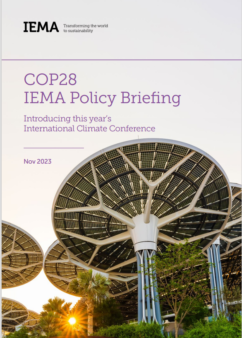New IEMA briefing on COP28 - November 2023
IEMA is delighted to introduce a new guide to COP 28, the UN climate conference being held in the UAE from November 28th to December 10th. In this blog Chloë Fiddy, IEMA policy and engagement lead on climate change and energy, highlights the topics that will be exercising the negotiators and IEMA’s call for a step-change in the way green skills are prioritised.
We're all familiar with the Paris Agreement, in which 195 countries set themselves the goal of limiting global warming to well below 2°C, and ideally not more than 1.5°C, compared to pre-industrial levels. Eight years later, and in the week before COP28 starts, the UN Environment Programme has reported that in fact we’re looking at increases of between 2.5 - 2.9°C.
An overarching theme at COP 28 will be the first ever Global Stocktake (GST) – an inventory of where the world stands on climate action, and an identification of the gaps in action. Unsurprisingly, given the modelling cited above, the headline findings of the stocktake are that action on climate change is happening but more is needed. It finds that governments need to support transformations of the economy that mainstream climate resilience and low GHG emissions development; and reminds us that economic transformation should not be at a pace that has a disproportionate or negative impact on specific groups in society.
As set out in our COP28 guide, a key theme for IEMA will be capacity building: developing the skills, abilities and resources needed to survive, adapt, and thrive within the context of climate change. This includes: technology development, dissemination and deployment, access to climate finance, relevant aspects of education, training and public awareness, and the transparent, timely and accurate communication of information.
As the home of professionals in the climate sector, naturally, IEMA has always promoted education and skills. We firmly believe that professionals need to be encouraged into the sector and that their ongoing development is critical for progress. Furthermore, non-climate professionals need at least an overview understanding of why they’re doing what they’re doing when it comes to their organisation’s mitigation and adaptation programmes.
This year, IEMA has formally written to the Minister of State for Energy Security and Net Zero to request that the UK works with its international counterparts to ensure that the cover decisions reached at the UAE negotiations adequately reflect the need to invest in and develop a global workforce that can tackle climate change head on.
Specifically, we would like to see a cover decision that mandates a requirement for Paris Agreement signatories to include a detailed education and skills investment and development roadmap as part of their Nationally Determined Contribution to the UNFCCC.
Turning back to the central conference debates, the outcomes of which will rely on green-skilled workers, key topics covered in our guide are again mitigation, adaptation, climate finance and loss and damage.
Mitigation gaps, (those gaps between what countries need to do and what they’re promising, and those between what they’re promising and what they’re actually doing) are huge. These must be addressed at COP. Developed countries are committed to undertaking absolute and economy-wide emission reduction targets while developing countries should continue enhancing their mitigation efforts and are encouraged to move over time towards economy-wide emission reduction or limitation targets in the light of different national circumstances.
Progress on adaptation needs a huge step change. Current efforts go nowhere near far enough to protect increasingly climate-vulnerable communities, while climate change is already setting back previous gains. As targets on mitigation are missed, the requirements for adaptation will only grow.
The key stumbling block remains finance. Climate finance is increasing, but it remains far below what is needed. The establishment of a Loss and Damage fund, a headline outcome from COP27, is mired in disagreements about where it should be based as an institution, who should fund it, or who the recipients should be. The resolution of this must be an outcome of COP28.
The international financial system for mobilising climate finance needs transformation. Public funds are critical, but will not be sufficient to meet the challenges, and private-sector finance and capital markets need to help finance adaptation and climate-resilient development. An enormous amount of work, innovation and goodwill will be required to achieve all of this. However because it requires the engagement of private capital, it goes beyond what individual countries can promise in negotiations, presenting additional structural challenges.
Once again, the international negotiators will be arriving with an enormous amount of work ahead of them, with the challenges to be resolved in two weeks becoming greater, not smaller each year.
IEMA’s COP28 guide is available here.
Subscribe
Subscribe to IEMA's newsletters to receive timely articles, expert opinions, event announcements, and much more, directly in your inbox.
